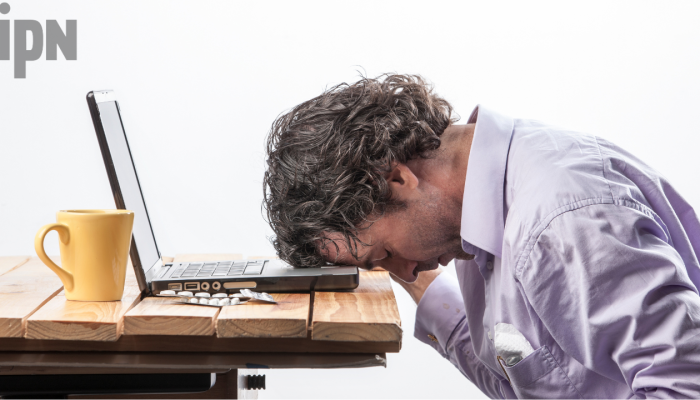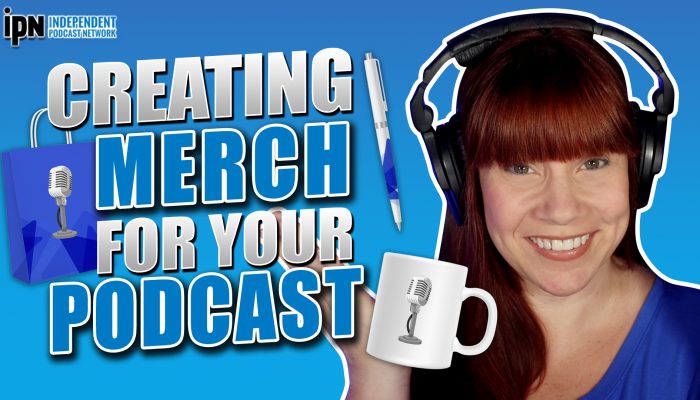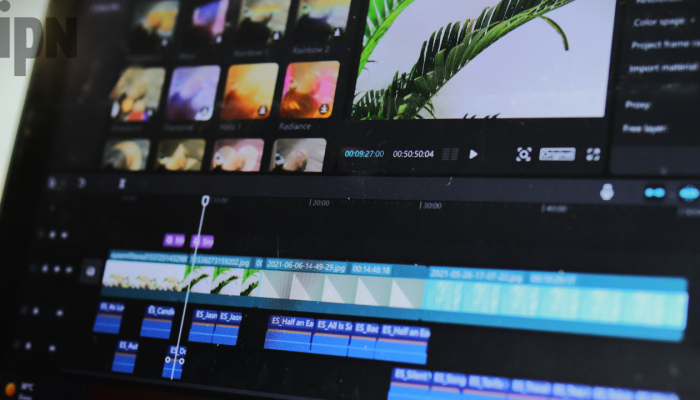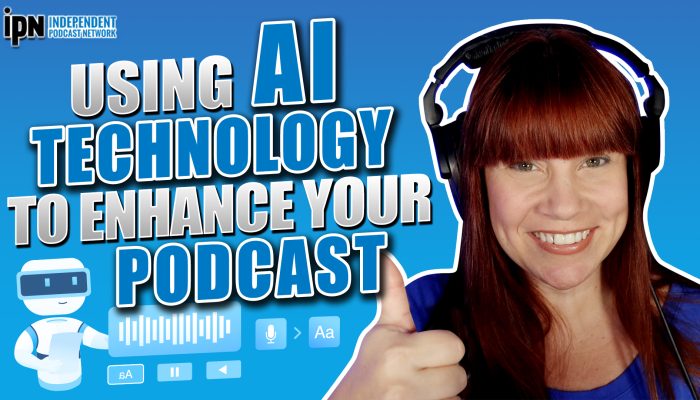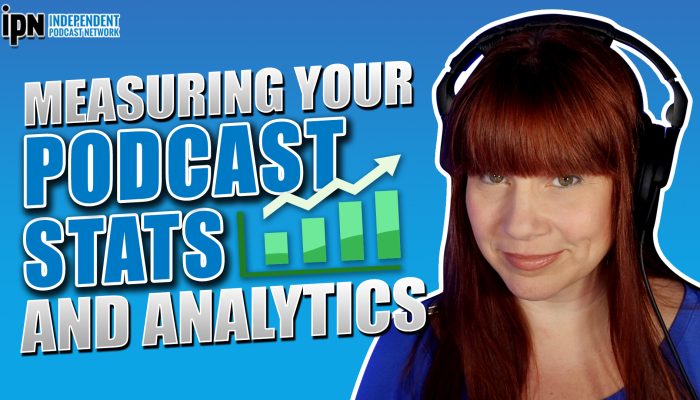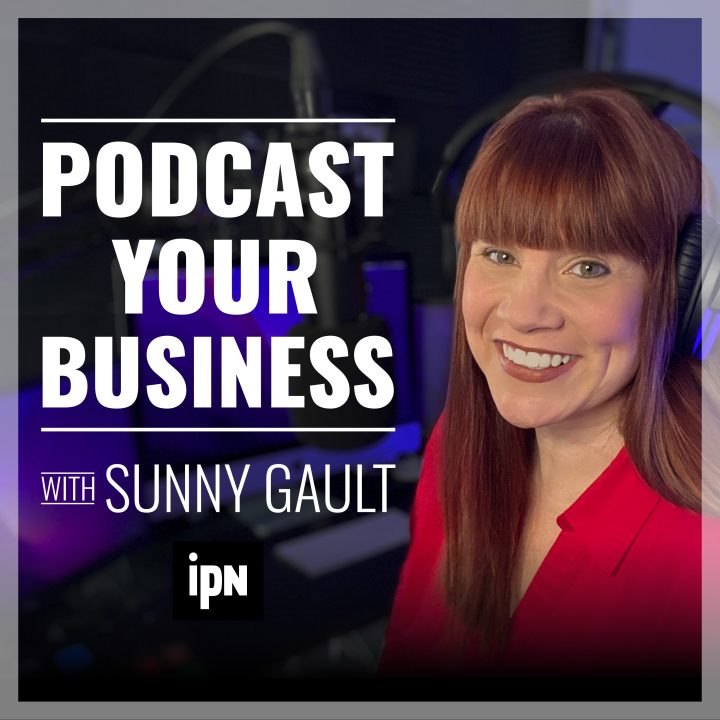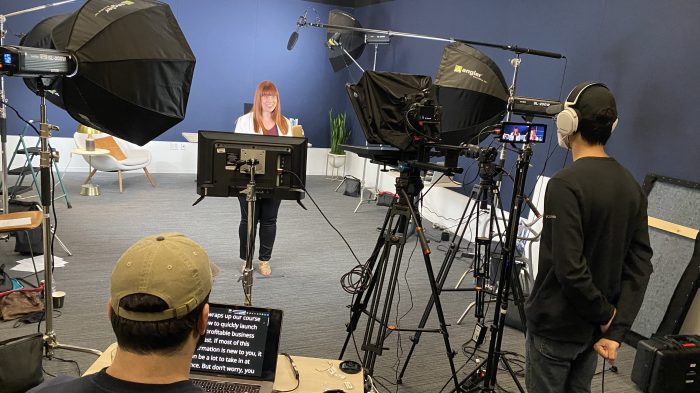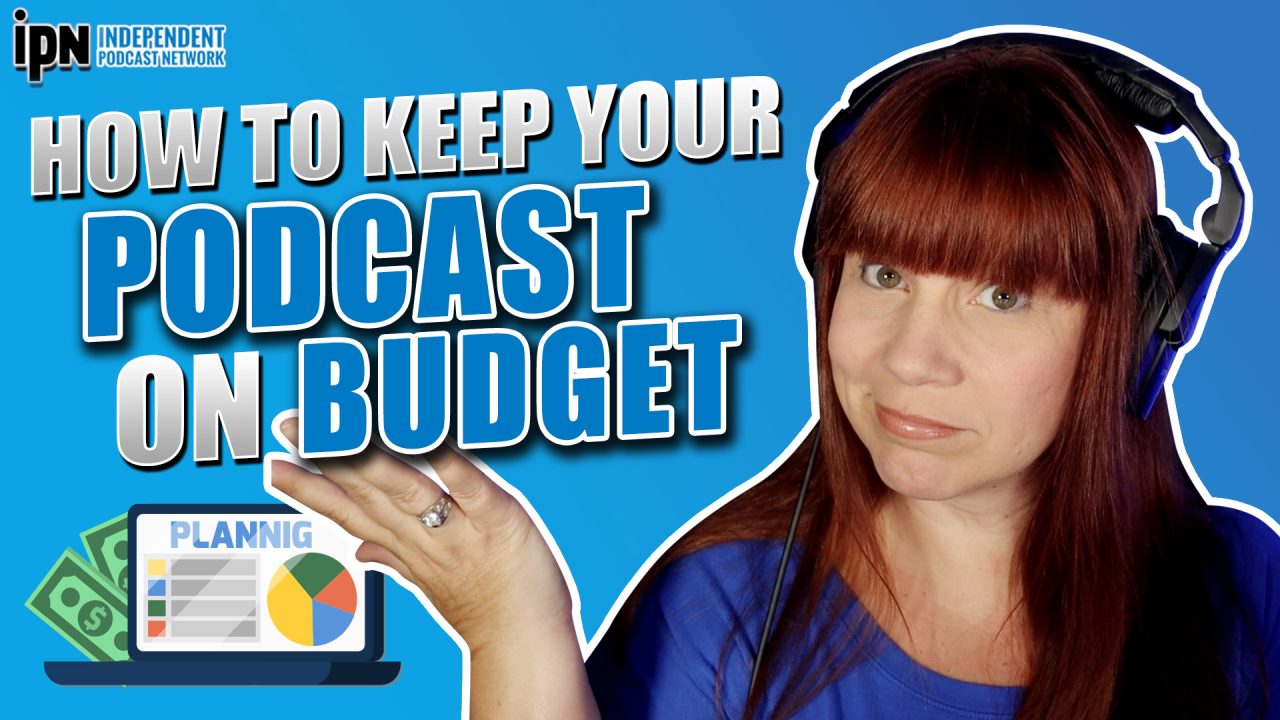
learn how to create a budget and stick to it!
Every podcast needs a budget or plan for how much time, energy and money podcasters are going to put into their shows. So, how do you put your budget together and what are some of the common pitfalls many podcasters face that could throw their budget off course? Whether you’re podcasting just for fun, or your podcast is specifically tied to your business, it’s always a good idea to plan in advance so you don’t overspend— and that’s what we’re talking about today!
Here’s what we’re talking about today…
- What to consider when creating your podcast budget
- Common pitfalls that throw podcasts off budget
- Ways to keep your podcast on a budget
- How to increase your podcast budget
Also, here’s our blog post featuring more tips on how to keep your podcast on a budget.
Looking for a great deal on podcast editing? Try PodMachine! Use our special promo code IPN and save 5%.
here are the steps needed to start your podcast!
Grab this guide and start checking off each item as you complete it. Before you know it, your podcast will be ready to launch!

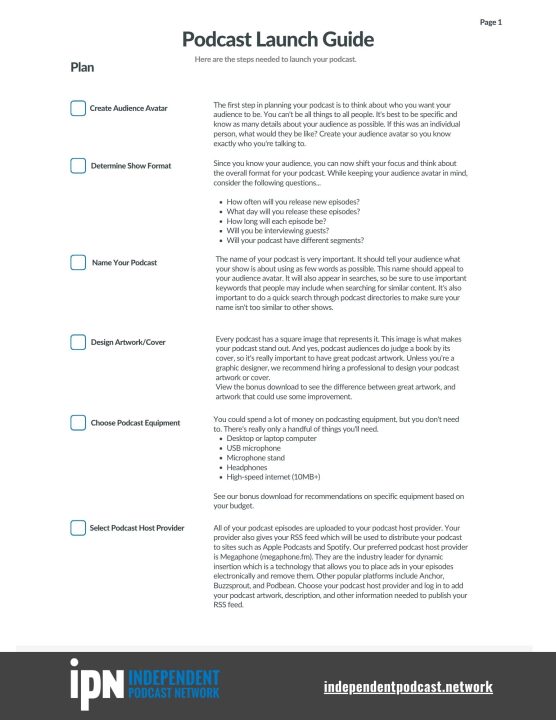
Episode Transcript
0:01
Every podcast needs a budget or plan for how much time energy and money podcasters are going to put into their shows. So how do you put your budget together? And what are some of the common pitfalls many podcasters face that could throw their budget off course, whether you’re podcasting just for fun, or your podcast, specifically ties to your business. It’s always a good idea to plan in advance, so you don’t overspend. And that’s what we’re talking about today. Take it away, Mr. radio man. Podcast Your Business.
0:39
Hey, hey, everybody. Welcome back to another episode of Podcast Your Business. And if this is your first time listening to the show, welcome. I’m Sunny Gault. I’m a podcast coach and mentor. And I’ve been podcasting for the last 17 years. I’m also the founder and CEO of a company called Independent Podcast Network. It is a mouthful, and has a really long URL to go with it. But I encourage you guys to check us out at https://independentpodcast.network. I have a ton of free resources, including this podcast, but also handouts, I’ve got free podcast courses. We have a new blog post that’s released every week. And all of that’s on our website. So be sure to check that out. Today. I’m here to help you create amazing podcasts specifically for your business, although you will probably get a lot out of this podcast, even if you’re just podcasting for fun. So how do we do this? We do this by mastering the five P’s of podcasting.
0:43
I believe in order to have a successful podcast, you need to know what the five P’s are, and you need to do them to the best of your ability. Okay, so the five P’s are prep, plan, produce, promote, and profit. Prep has to do with even starting the podcast in the first place. What are your motives behind it? What are you trying to accomplish? Then when you plan for your podcast, we’re talking about the look and the feel for your podcast, and how were all of these different puzzle pieces gonna come together to create your show producing is the actual production work for the podcast. So we’re talking about recording and editing, all that good stuff. And then when you’re done with that, you promote right, so that’s the fourth P, and then profit is the fifth P and that is all about making money with your show. Not that that’s the only reason you do your podcast. But let’s face it, if you’re not making money doing your podcast, it’s not going to be as high on your list of priorities. And I don’t want anybody here to podfade. So you start a podcast and you slowly do less and less and less. You’re slowly fading out right? We don’t want that for anyone. So Mr. radio man, what are we talking about today of the five piece? Plan.
2:51
Yes, sir re because when you are budgeting for your podcast, that is part of the planning process, you can always go back to it doesn’t have to be just when you’re first starting your show, you can go back to it. And you may have to adjust your budget along the way, we’re going to talk about all of that today, I totally didn’t mean to rhyme that was just a fun little thing that just happened. Alright, so there are many different types of podcasts out there. And sometimes there’s a huge team of people that are producing a show, right, some of the big networks have 20-30 plus people working on a show. So those type of shows require a larger budget. And then sometimes you’re like me producing podcast your business all by yourself in your converted garage. It’s not a garage anymore. It is now a studio, but I see a garage door right next to me. Or perhaps you’re in a closet. And that’s how you do your recording, you virtually have no budget, or maybe your show falls somewhere in between. So you’re not doing it with a big team. You’re not doing it by yourself, but you’re somewhere in the middle. There is no one size fits all when it comes to podcast budgets. There’s just a lot of factors that go into this. Now, they may have some of the same line items, right? When you’re looking at an expense or a budget, you’ve got your line items, but the money allocated to those items may look completely different. So how do you create a budget that is best for your specific show? That’s the focus of today’s episode. So here’s what we’re going to discuss. We’re going to go through the steps of how to create a budget for your podcast, which basically means what are the things that you really need to consider in order to create a budget. We’re also going to talk about some of the common pitfalls that throw podcasts off budget and ways to avoid that from happening, ways to keep your budget or keep your podcast on budget. And then I also want to talk a little bit about ways to grow your podcast budget and that doesn’t mean just putting something on a credit card. hoping that it pays for itself. Okay, I’m talking about legitimate ways, and how do you know when it’s time perhaps, to invest more money into your show. So we’re going to get started talking about all that good stuff right after this quick break.
5:13
Podcasts require your time, your energy, and sometimes your money. And all of that should be considered when we’re talking about a podcast budget, don’t just think of money, okay? Because you may be able to work things out so that technically, your podcast isn’t going to cost you any money. When I launched a new podcast now, it rarely costs me very much money, because I already have all the equipment, right? I may have to get some new artwork, but I have a lot of resources that I can repurpose that I’m already using in other ways. So don’t just think about this from a money perspective. But I want you to think about your time and your energy that needs to go into this new project as well. Because if you think about it, all money is and all it represents is energy, you had to do something, you had to expend some sort of energy in order to get that money. And so that’s all money really represents. So it’s all kind of the same thing. But think about your time and your energy you’re putting into your podcast as well, all of this is part of your budget. So what should you consider when creating a podcast budget, the first thing I would recommend is that you really need to know what the goals are for your show. Now, if any of you have taken my free online course, for the five Ps of podcasting, that’s one of the first things we talk about, is what are your goals, because before you allocate any money to anything, you have to know what you’re trying to accomplish. And then you figure out the steps to get there. Right. So for example, when I started new mommy media, which is, I guess you could call it the production company, for the five parenting shows that I do. When I first launched that network. I had to think about what my goals were. And I knew I didn’t just want to launch one podcast, because I went into it, knowing that I wanted this to be a business. And I thought, well, it might be really difficult just to launch with one show and create a business out of just one podcast that didn’t sit right with me, that was like way too many eggs in one basket. So what I did is I actually launched with three shows, and the shows cross promoted each other was kind of like creating our own little community. And I felt like that is what I needed in order to make enough money to turn it into a business. But if I hadn’t thought of that in advance, and I would just been like, I want to start a podcast and you go in there with just one show, well, I probably wouldn’t have been nearly as successful. As in thinking about the big picture. Now we change from doing just three shows. And then from there, we added a fourth show, and then a fifth show. So it’s okay, your plan obviously is going to grow, things are going to change. But you need to know what you’re getting yourself into and what you want to see happen here. So you have to know what your goals are.
8:11
The other thing that ties into this is how quickly do you want to accomplish these goals, because everybody nowadays is like, I want it now now now. But if you do things faster, usually that means more money, because it’s going to mean more people, a lot of times more equipment, or maybe a huge marketing push, right, and the finances that are going to have to go into that in order to make things happen faster. Now for me, and my you know, Seuss my example for the new mommy media shows, I knew that I wanted them to be successful, but the rate that we went in order to make it successful, I had more flexibility with that as long as I had some people to help me host my shows and do things like that. And yes, that was part of the management of everything is keeping everyone motivated and excited about doing the shows. But it was okay to take a little bit more time because I didn’t want to have to owe people money. I didn’t want to, you know, get into debt and things like that. So I was okay with taking my time. So know how quickly you want to accomplish your goals as well. You also need to think about what your podcast is going to be and what it is going to look like. So I talked about this in terms of your format. Think about the format of your podcast, for example. And you’re probably not going to do this for your business. But again, just trying to illustrate a point. If you’re going to do some sort of audio drama, where you know, there’s lots of interviews and maybe there’s different locations where you need to shoot, that’s going to be a lot more involved. That’s going to take more production, more equipment, you’d have to probably pay some people to do some different things. If you are doing this for your business, you might not be doing an audio drama, but you’re probably doing some sort of podcast where it’s either you talking or you’re also inviting guests to be on your show, right. So now let’s think about it from a time perspective, it’s going to take some time to plan out the topics for your show. When I do the episodes for podcasts, your business, it takes me usually, I don’t know, a couple hours sometimes to do the research behind it. And, and I already know this information, I just want to present it the best way possible. So it still takes me time to research the topics. If I had guests on the show, which I haven’t yet, I’d want to research those guests, I’d want to learn a bit more about them. And then you know, the entire time that it takes to actually schedule them and the going back and forth and preparing them for the recording, and everything that’s involved with that. So think about that more, perhaps from a time commitment. Now, if you’re listening to this now, like I just I’m planning to start a podcast with my friend about our favorite show, and it’s just going to be more chit chatty, and you know, not as involved, well, there’s probably going to be less preparation for that, you may be able to do that with just minimal equipment, maybe you can just use the headset that you use for work for your online meetings, right? Because you’re not necessarily trying to put a lot of effort and time into this. It’s something that you’re just doing for fun. So that may not have as much of a budget.
11:28
Once you’ve figured out what your goals are going to be for your podcast, you’ve also considered the format for your show, you now need to consider the actual hard costs to make all of that happen. So when I first launched podcast your business, I did an episode called “How To Start A Podcast for $250 or Less”. If you haven’t listened to that episode I recommend you do now we’re just talking about starting a podcast. In that episode, we’re not talking about the longevity of your show. But I think that’s going to give you guys a lot of ideas on how you might be able to adjust your budget and make it work for you and what your constraints might be. But let’s go through some of these, these big line items, right that we constantly have to choose are we going to do this or we’re going to do that, the first thing that comes to mind is let’s just call it the studio. Okay, you could, and I know a lot of people that actually do this for their business, if they don’t want to get into the nitty gritty of what it’s going to take to launch and do a podcast on their own on a regular basis, they will put a line item in their budget for their business, probably in marketing, to pay to show up at some sort of studio and someone else records for you, you know, you’re talking into the microphone, you do the actual content prep, but they are doing all the production work, they do the editing, and then give you the file and then you know, some people will then just hand that off to their social media person or whatever to post. And so it can be that hands off if you want it to be and sometimes it’s worth it, you really do have to think about the time because I know a lot of you are running your own businesses and wearing multiple hats. So how much time and energy can you devote to doing this yourself, it might be better off, at least for the first season. You know, if you’re brand new to this, to hire someone to do all that kind of stuff, you just show up and you give the good content, and that’s your contribution. There’s nothing wrong with that. Okay, so you’ve got the pro route, obviously, that’s going to cost you more money up front. If you don’t have that kind of budget, and you’re doing kind of more of a grassroots, you know, doing things on your own, then you have the home studio option, right, which is what I have pretty much done with most podcasts I’ve launched. When you think about that, you’re gonna have to think about the elements that go into it. So obviously pro, you know, everything’s already there.
14:03
For your home, what are some of the big things that you’re going to need in order to produce your podcast in that kind of environment? First of all, you need to have a decent computer. All right, it doesn’t have to be brand new, but you got to have decent computer, you may have to have internet depending on how you’re doing your recording for your shows. So make sure everything is up to date, make sure all your apps are up to date. That’s a necessity. The next thing is you’re going to need some sort of microphone and we just did an episode in fact, I think was the last episode I did prior to this one was all about podcasts microphones, I encourage you to check that out. My bottom line with that is especially if you’re brand new to podcasting do not break the bank for your mic, but you do need a good external microphone. You can get them for $100 or less now it’s not that difficult to do. So you You need a microphone. But don’t go crazy. You’re also going to need a podcast hosting platform. So just like you have website hosting for your website, you have podcast hosting. And it’s really important to find a reputable one. Most of the ones that when you just Google podcast host provider, those are going to be reputable. Don’t use like a Squarespace or a WordPress, or just upload your files that way. Because it’s not going to have the necessary tagging that you really need, it’s not going to give you the analytics that you need, it’s just kind of a mess. So find a legitimate podcast host provider to host your podcast, you’re also going to have to have a way to record your episodes. And I think one of the easiest ways to do this is to use a remote recording platform, whether or not you have guests or you know, you really need a platform for recording with guests remotely, it’s still usually easier just to hop on there and record. And then you need to think about editing to I usually don’t recommend that people start out doing their own editing, unless you’re not planning to do very much editing for your show. And we’ve done previous episodes on that as well. So that usually means doing some sort of outsourcing for your editing. So when you think about your home studio, those are some of the main costs that you have to think about up front.
16:18
Some of you may be in a position where you need to bring on a co-host, other hosts, maybe voice actors, you know, maybe not so much if you’ve got a business podcast, but my encouragement in that and what I’ve done over the years, because I have several shows that I do not hosts that I am the producer or the main person that kind of makes everything you know, grease the wheels and makes everything work, I usually find everyday people to host the shows, as opposed to someone who is more experienced in the podcasts industry. So whatever your content is about, I think it’s more important for those people, whoever is doing the hosting for your show, to have experience and interest in that topic, as opposed to being superduper professional, and I’m a podcast host, and this is what I get paid. Because there are people out there that will do that. So what I have done with my parenting shows is I have every day parents host the show, they know the content, they’re passionate about their kids, they usually want to learn as much as they can to be a great parent. And it’s just more authentic. So don’t necessarily just go where everyone’s going for that kind of talent, you will definitely save money. If you just find real, honest, authentic people that can work on your project with you also think about your marketing and your promotion costs. So maybe you’re like me, and you don’t have much of a budget for that for podcasts, your business, I have a newsletter list. And so I let the newsletter list know when we’ve got new episodes. And the other thing that I do is I’m not doing this right now a lot. But I would appear on other people’s podcast to talk about how to podcast and I would mention podcast your business as a free way that they could stay connected with me. Neither of those cost me any money. But did it cost me time? Yeah, yeah, so did still, you know, was something that you should consider in your budget. Because after a while, I had to kind of put the brakes on that because it was taking up too much of my time. But that’s just something to consider whether it’s time or actual physical dollars, money, whatever you’re using for currency. You know, consider all of that as part of your budget.
18:29
Here are some additional pitfalls that podcasters face. Many podcasters are paying for things that you technically can get for free. And I usually recommend to start on the free side of things, until you outgrow that, and you need to move somewhere else. So the first thing I think of our podcast hosting platforms, you have to be careful because you don’t want these hosting platforms to put anything into your podcasts like ads and things like that without your knowledge or without your approval. But there are some really good hosting platforms out there that you can get absolutely for free that will provide you with good statistics, because that’s the other thing you need to know who’s listening to your show. So you can make decisions like that regarding content. But that’s something that a lot of people are paying for the technically you don’t have to pay for. Also remote recording platforms. We talked a little bit about that earlier, you can usually get those for free, or there’s usually a free option out there. So you don’t have to pay in order to record your podcast. I think podcasters also overpay quite a bit when it comes to editing and I will include myself in that category for years. I was paying friends of mine or people that I knew in the business that I was working with and other ways to edit an episode and a 30 minute episode was costing me about $80. Now there’s a company that I’m using called pod machine. I’ve talked about them on this podcast before and I can get through a monthly subscription I can get four episodes edited every month, for $50. Total, that definitely helped my budget, don’t you think?
20:08
So let’s talk about ways to keep your podcast on budget. So you’ve created this budget for your show, how do you stay on budget? Now, I’m the first to admit that sometimes you’re just gonna have to make adjustments, there’s unforeseen things that happen. And you’re gonna have to make adjustments to your budget. My recommendation, and that is, if you have to increase in one area, try to decrease in another guys, this is simple math, you have dedicated X amount of money and energy, whatever it is, to your podcast. So if something ends up being more expensive, that’s okay, decrease it in another area. Also audit yourself, this is probably the best piece of advice I can give you. I do have a business coach. And she recommended that I do that this last year, and it was a game changer. What I mean by that is, figure out how much money you’re spending, and then ask yourself some tough questions. Do you really need to be spending that money? Do you really need that program? You know, is that service really working for you? Or is there something else that may work better? Because as you know, companies are changing, they’re offering more and more services? Is there any way that you can combine services? So instead of having a company that does transcriptions and a company that also does remote recording? Is there a platform that actually does both? Because that is happening more and more. So how can you save money that way? When I did an audit, and I did an audit on my entire business, but my entire business is about podcasting. So when I did that, you guys, I saved $1,000 per month, because sometimes I had a plan. And I didn’t really need a plan that costs that much money. So I downgraded and a bunch of different ways. Anything that I use to run my business, that’s what I did. And you can do the exact same thing for your podcast.
21:56
So that’s how you keep your podcast on budget. But how do you grow your podcast, your budget for your podcast, I should clarify. Because as your podcast continues to grow, your expenses are going to get a little bit more and hopefully, you’ll have more money to be able to cover those costs. When we talk about growing your podcast budget, that does not mean charging money on a credit card and figuring out later how you’re going to pay for it. That’s not what we’re going to do. We are going to discover ways to offset any additional costs that we’re thinking about bringing on for our podcast. So here’s some questions that you should be able to answer after you’ve been podcasting for a little bit. For those of you who have a podcast that ties into your business, are you bringing on additional clients through your podcast? When new people reach out? Are you asking them? Hey, how did you find my podcast? Or how sorry? How did you find my business? And if they say, oh, it’s through your podcast, then you can chalk that one up, right? And then you need to figure out how much of that money that is coming in through that new client that came to you through your podcasts? How much of that is going to go back into your podcast? Because technically it should it generated the funds. So let’s invest a little bit more money into your podcast. So that’s one way to do it.
23:11
Are there other ways that your podcast is bringing in money, so maybe you don’t work with clients, but maybe you work with advertisers? That’s one of the things that IPN my company does is we partner with podcasts, we help format their shows for dynamic ad insertion, because I’m a big fan of that. We find them campaigns, we run the campaigns, we handle the finances, we basically make it more convenient for them to be able to make money with their show. So they can do that more easily. And then if they choose to they can invest some of that money back into their budget. What are some creative ways that they can do that? What are some of the things that they wish they didn’t have to do that they’re currently doing right now, usually editing is at the top of that list. But that’s how you grow. Your Podcast should be generating some sort of revenue in order to truly be able to justify putting more money back into your show. If you are new to podcasting, sometimes we have this battle and the battle for creating new budget is really knowing everything that you’re gonna have to do in order to even start your show. Because if you haven’t done it before, you don’t really know everything that goes into it. Right. So we have a free handout this week that’s going to help you with that more after this quick break.
24:26
Everybody loves free stuff, right? So before the break, I was telling you about my free podcast launch guide. And this is a guide. It’s a few pages long as a PDF and it will go through all of the steps to start a podcast. You can literally just check this kind of stuff off. And the reason I bring it up for today’s episode is you really do need to know what’s involved in starting a podcast before you can figure out your budget. So if you’re brand new to podcasting, this is going to help you it’s absolutely free. All you need to do is go to the link in the description to download this free guide. While you’re at it guys. I would love for you to check Independent Podcast Network (https://independentpodcast.network). We’ve got a ton of free resources just like the handout that I’m promoting today, or just do a search on the website because we got a ton of free content even if you’re not brand new to podcasting. Until next week, remember….you should start a podcast!
